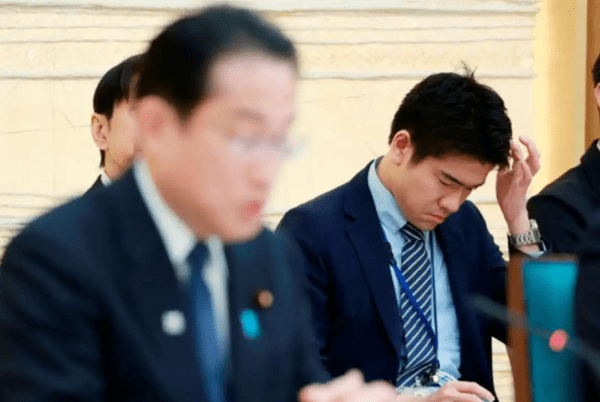Japan must break free of political dynasties
June 7, 2023 · By Cristian Martini Grimaldi for www.ucanews.com

Shotaro Kishida (right), son of Japan’s Prime Minister Fumio Kishida (left), attending a meeting at the prime minister’s office on May 15. Kishida said on May 29 he will remove his son from the position of his secretary due to ‘inappropriate behavior’ at the official residence. (Photo: AFP)
Japan must break free of political dynasties
The recent resignation of Prime Minister Fumio Kishida’s son, Shotaro, from his executive secretary position has highlighted the pressing need for reform within the Japanese political system.
Shotaro’s departure followed public criticism of his hosting an end-of-year party at the prime minister’s official residence, blurring the boundaries between public and private interests.
This was not an isolated incident but rather one in a series of instances where his actions have brought embarrassment upon himself and his prime minister father.
This event serves as a reminder of the long-lasting issue of political dynasties in Japan, where family connections often determine political positions, hindering progress and compromising the moral integrity of the political system as a whole.
Shotaro Kishida’s case is in fact emblematic of a long-standing tradition in Japanese politics. Numerous prime ministers and ministers of the past, including Shinzo Abe, Yukio Hatoyama, and Taro Aso, have sprung from political dynasties, often lacking qualifications beyond their family ties.
This perpetuation of political power within certain families can definitely be construed as the root cause of the constraints on the emergence of fresh ideas and perspectives within the political landscape, creating stagnation and perpetuating old ideas.
Furthermore, family members inheriting political positions raises questions about meritocracy and the fair allocation of important and well-paid roles based on qualifications and expertise.
When politicians secure positions solely through familial ties, the potential for corruption, nepotism, and favoritism becomes evident.
This is all the more puzzling in a country like Japan which, when it comes to professions other than politics, places a significant emphasis on meritocracy, valuing individuals based on their skills, abilities, and achievements rather than solely on factors like social status or personal connections.
The concept of meritocracy in Japan is deeply ingrained and impacts various aspects of society, including education, employment, and social advancement. Anyone who has lived in Japan long enough can testify to this.
In the realm of education, for example, Japanese students experience a highly competitive environment where they are encouraged to strive for academic excellence. Success in standardized exams, such as the university entrance exams, is often seen as a reflection of one’s merit and can greatly impact future opportunities.
When it comes to employment, the standards don’t change. Japanese companies tend to value individuals based on their qualifications, experience and demonstrated abilities. The hiring and promotion processes often prioritize merit, with assessments that evaluate an individual’s skills and performance.
Hard work, dedication, and a strong work ethic are highly esteemed qualities in Japanese culture, and those who consistently demonstrate exceptional abilities are more likely to be recognized and rewarded.
Just as professionals in other fields undergo rigorous training and education, political leaders should also possess the necessary knowledge and skills to effectively govern. But as a matter of fact, this idea is entirely foreign to the Japanese political culture.
Implementing a thorough selection process, such as shukatsu (or activity for job searching) for example, would require aspiring politicians to demonstrate a deep understanding of policy-making, public administration, and the socio-economic challenges facing the nation. This would ensure that political leaders are equipped to make informed decisions and effectively address the needs of their constituents.
Undeniably, this perpetuation of political dynasties is not merely a political issue; it also has significant moral implications.
It goes against the principles of fairness, equal opportunity, and merit-based advancement that should underpin a democratic society. When positions of power are inherited rather than earned, it denies deserving individuals the opportunity to contribute and stifles social progress.
Addressing the issue of political dynasties requires comprehensive reforms. Stricter regulations, such as clear conflict-of-interest guidelines and limitations on familial succession, are necessary to ensure fair and impartial governance.
Encouraging the emergence of new leaders from diverse backgrounds can bring fresh perspectives and ideas into the political arena. Unfortunately in Japan, this is not the case.
The reputation of the political profession in Japan has been tarnished over the years, leading to a significant decline in interest among individuals considering a career in politics.
To restore public trust, meaningful restructurings must be pursued to dismantle the systemic barriers imposed by the political dynasties. By embracing meritocracy and ensuring that positions are earned through qualifications rather than inherited, Japan can foster a more open, transparent, and respectable political system.
*The views expressed in this article are those of the author and do not necessarily reflect the official editorial position of UCA News.






